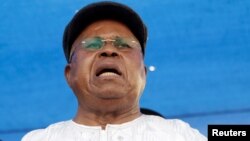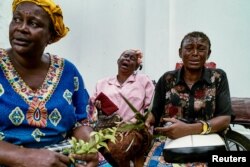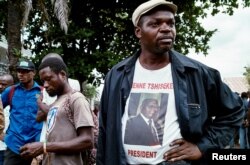Analysts say the death of Congolese opposition leader Étienne Tshisekedi could undermine a recent accord aimed at ending the country’s political crisis.
Tshisekedi, who died Wednesday in Belgium at age 84, is remembered as a steady and honest dissenting voice during years of violence and political turmoil in the Democratic Republic of Congo and its predecessor, Zaire.
Gérard Prunier, an author and historian specializing in Africa’s Great Lakes region, said, during the long rule of Mobutu Sese Seko, Tshisekedi refused to compromise on his beliefs or accept a highly paid position as a minister in Mobutu’s government.
“He was honest, he was steadfast and he even was big-headed, you could say, but at least he didn’t change every morning and go for the money and the benefits,” Prunier told VOA Thursday. “His character was strong, but very difficult, which is why he survived all that long in opposition. He never tarnished his name.”
Tshisekedi’s death leaves a vacuum at the top of the party he led, the Union for Democracy and Social Progress (UDPS), and in the DRC political opposition at a particularly important moment.
New Year’s accord
In December, DRC political leaders reached a deal for an election to be held before the end of 2017 and for current President Joseph Kabila to step down early the following year. Kabila’s efforts to stay in office past his mandated two terms have sparked widespread protests and drawn condemnation from around the world.
Albert Moleka, Tshisekedi’s former chief of staff, said progress was made recently in implementing the accord, negotiated with the help of the National Episcopal Conference of the Congo (CENCO) and the DRC’s Catholic bishops. The accord calls for a prime minister to be selected from the opposition and for additional power-sharing.
Moleka said Tshisekedi’s death “is a challenge both for the negotiations and for the political situation overall,” adding that it’s too early to know how events will play out.
“Let’s see how the people will react, and I think the political priorities will come later,” he said.
Bruno Tshibala, assistant secretary general of the UDPS, said work remains to be done to finalize the agreement, and Tshisekedi’s death has added uncertainty to the process.
“The death of a great leader of the character of President Tshisekedi couldn’t help but have a great impact on the negotiations to finalize the accord of December 31, 2016, and on the future of the country,” Tshibala told VOA’s French to Africa service.
UDPS future
Prunier is pessimistic about the immediate future of the opposition party and said Tshisekedi was the only thing that held it together.
“UDPS still existed because of him. His son will try to pick up the pieces as he can,” Prunier said, speaking of Felix Tshisekedi, who some hope can fill his father’s shoes.
“Given the extraordinary disparity of the Congolese political landscape, nobody will manage to keep the UDPS in one piece. It will explode and go in various directions,” Prunier predicted.
Tshisekedi had also succeeded in unifying disparate opposition leaders, including Moise Katumbi, the governor of Katanga, to form a unified front against the Kabila government.
Tshisekedi, born in Kananga, founded the UDPS in 1982 and was the runner-up in the 2011 general election, which Kabila won.
He had traveled to Belgium this week for treatment when his condition quickly worsened. Radio France Internationale reported he died of a pulmonary embolism.
“The initial exams were good, but in a surprising manner, he succumbed,” Tshibala said.
Eddie Isango and James Butty contributed to this report.






